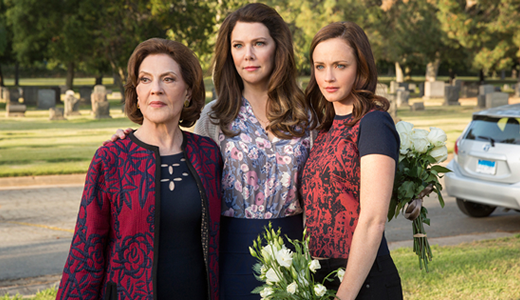It looks like Netflix wants more Gilmore Girls. According to Deadline Hollywood a few days ago, Netflix Chief Content Officer Ted Sarandos said they’ve had “preliminary” talks with the show’s creators for another installation of the Gilmore Girls: A Year in the Life revival.
I know that fans of Gilmore Girls would love for the show to come back. But it got me thinking about an article I read about the show several months ago in Parade magazine, specifically a little “throwaway” line that stuck with me.
Actress Alexis Bledel, who’s Rory on the show, was explaining that when she came back to Gilmore it was “important to [her] that there had been some reward for all that work.”
Well, was there? According to Bledel there was. According to the story, fans of the show regularly tell Bledel that her character on the show motivated them to study and work harder in school.
“It’s incredibly rewarding and energizing to know that young women find inspiration from the show, that they aspire to reach the highest education that they can get,” Bledel said.
You know, that pleases me. Education is extremely important. And a TV show that encourages viewers to set a higher personal bar for their own studies is a great thing!
But then—perhaps because of what I do for a living—I have to ask myself what other messages in Gilmore Girls might’ve “inspired” viewers to behave differently? How else might fans be impacted by the show? After all, Gilmore Girls has always been about more than studying hard. It’s about relationships. And sometimes those relationships go to some uncomfortable places. If viewers are inspired by Rory to study, could they also be inspired to sleep with a boyfriend because of her? If entertainment can influence positively, why not negatively?
I like the way game show host Pat Sajak once put it:
Television people have put blinders on and they absolutely refuse—and movie people too—to admit that they can have any influence for ill in our society. And you know the argument. It’s, “We only reflect what’s going on, we don’t perpetuate it.” And yet not a week goes by in this town (Hollywood) where there’s not an award ceremony where they’re patting each other on the back saying, you know, “You raised AIDS awareness, there’ll be no more child abuse thanks to this fine show you did.” The argument is you can only influence for good, you can’t influence for ill. That makes no sense at all.
Now, I’m fully aware that Gilmore Girls was actually heralded as a bright spot on the television landscape. And I also know there are a lot of bigger fish to fry on television these days (if I was trying to fry fish). But that isn’t the purpose here. My purpose is just to remind us all (me included) that media can impact us in ways we can’t easily put a finger on. Sometimes the influence becomes only clear years later.
Take the example of a 22-year-old girl called Lisa.
In 2008, ABC News talked with “Lisa” (she didn’t give her real name) about her one-time favorite show, Sex and the City—and how she believes the show turned her into a version of City’s hypersexualized protagonists.
“When you’re [a teenager] you try to emulate people on TV,” Lisa said. “Carrie smoked so I smoked. Samantha looked at hooking up with random people as no big deal and that’s what I did, too.” Now realizing that Sex and the City’s view of satisfying sex is myth, Lisa regrets her choices. But there’s no way to unscramble scrambled eggs.
My colleague here at Plugged In and TV guru, Paul Asay, when reviewing Gilmore Girls: A Year in the Life wrote: “Rory juggles boyfriends whom she’s obviously sleeping with, and Lorelai sometimes recounts her own carnal hijinks in discomforting detail.”
Is it possible that viewers, like Lisa with Sex and the City, have decided to juggle boyfriends that they’re obviously sleeping with and/or participate in their own “carnal hijinks?” I have no evidence to support that. But I mean, who writes or calls me to confess that sort of information?
Thoughts? In the comments section below, share with me (and other readers) how something you saw on television impacted something you once did (positively or negatively).






Recent Comments